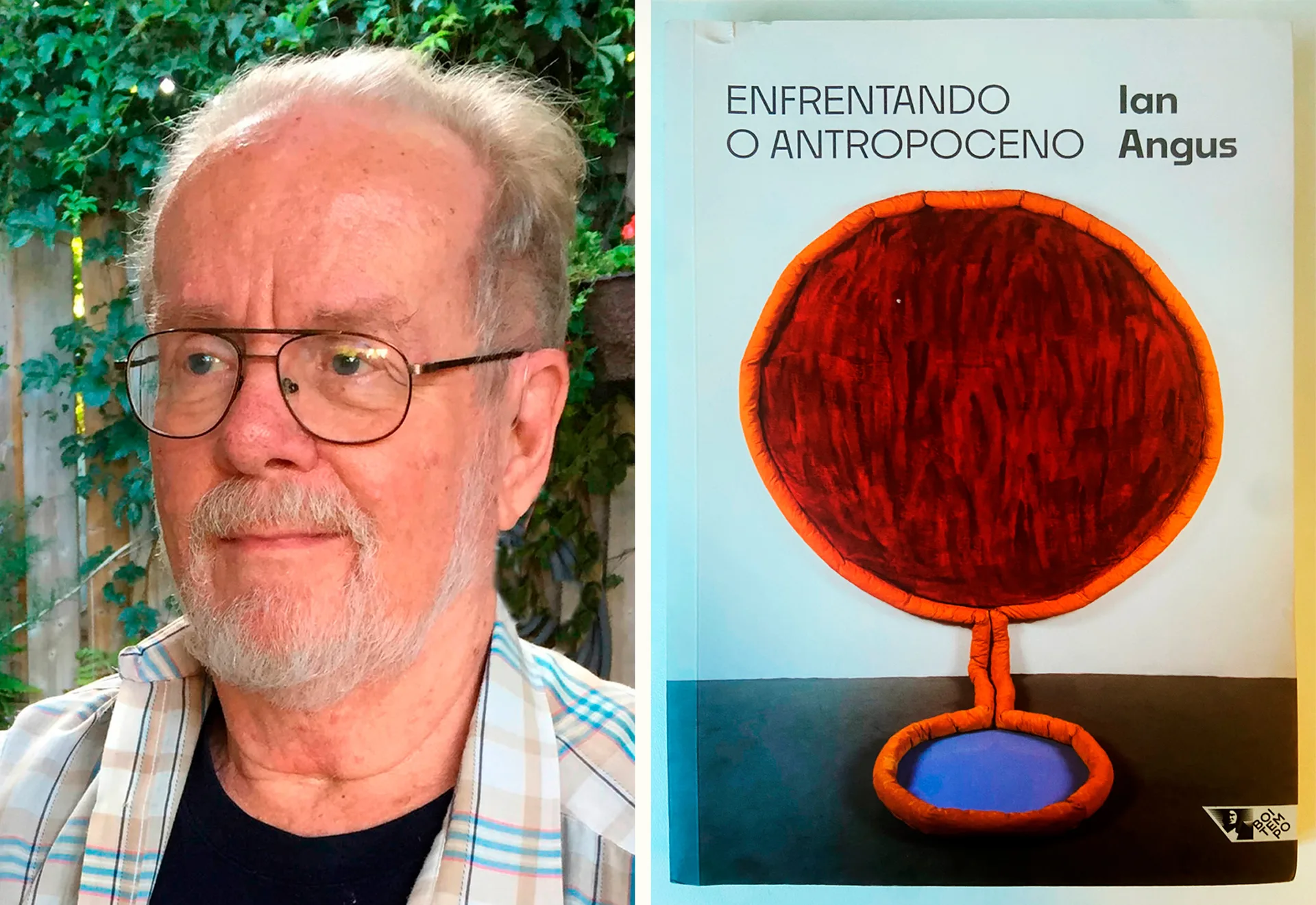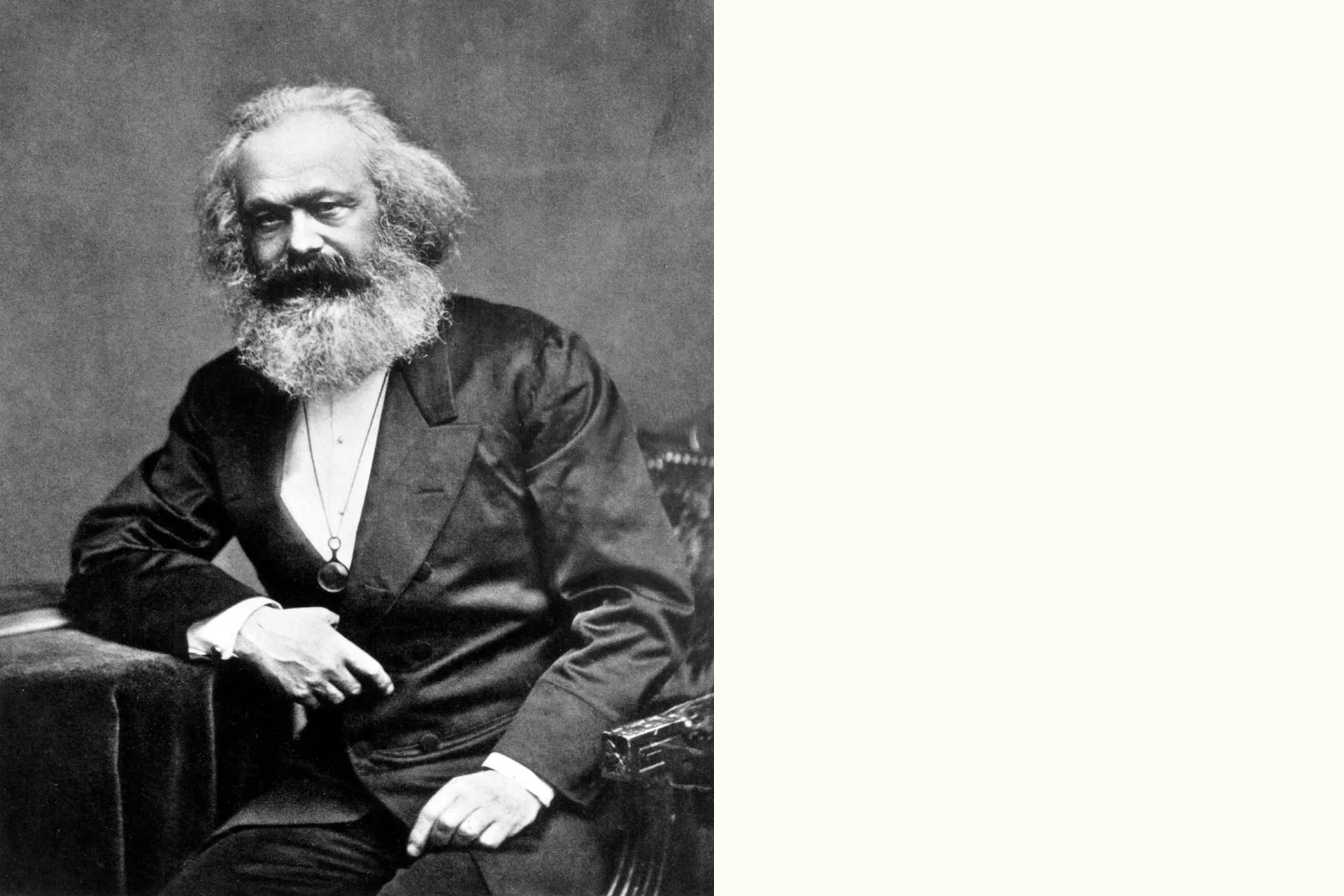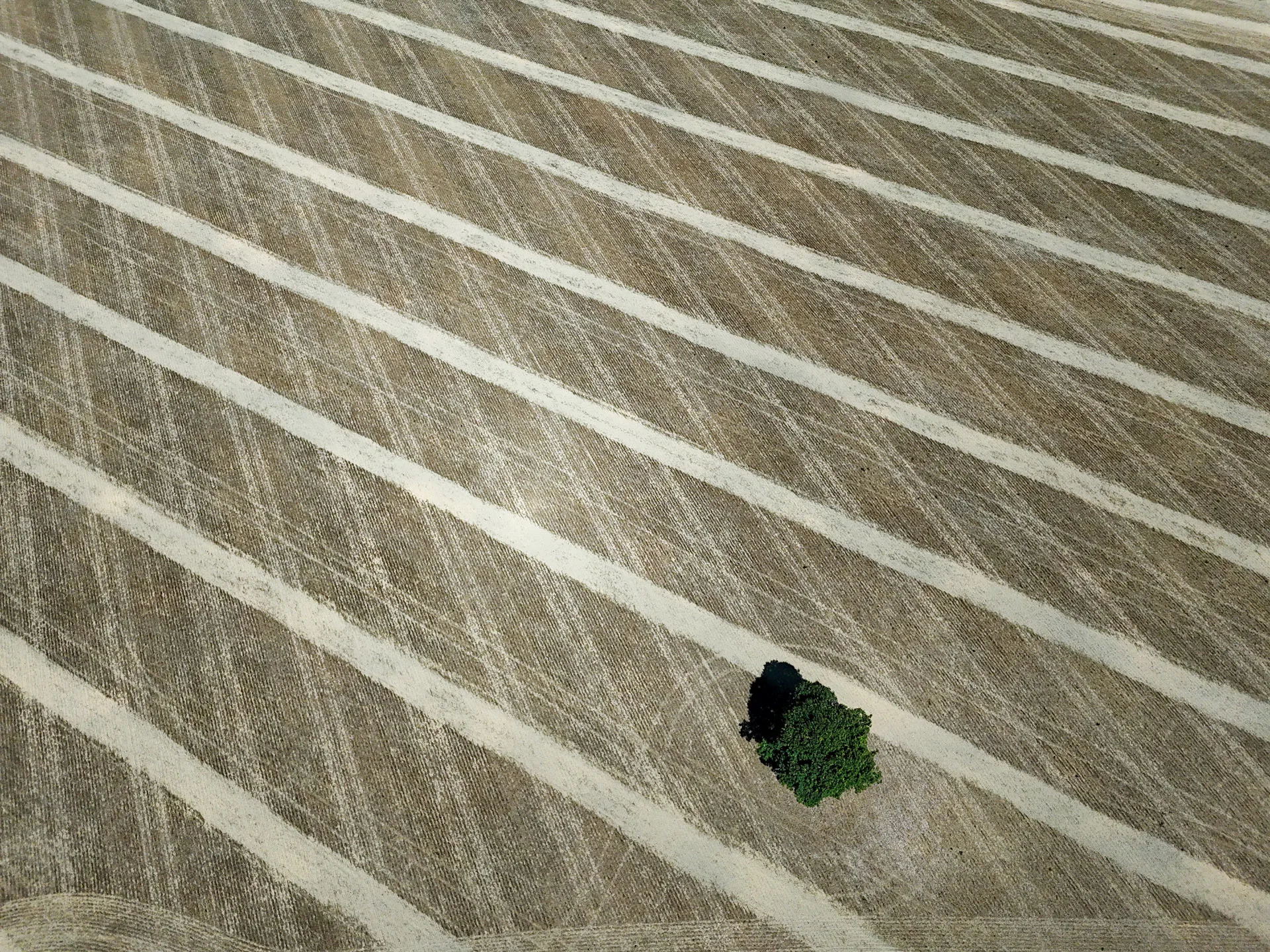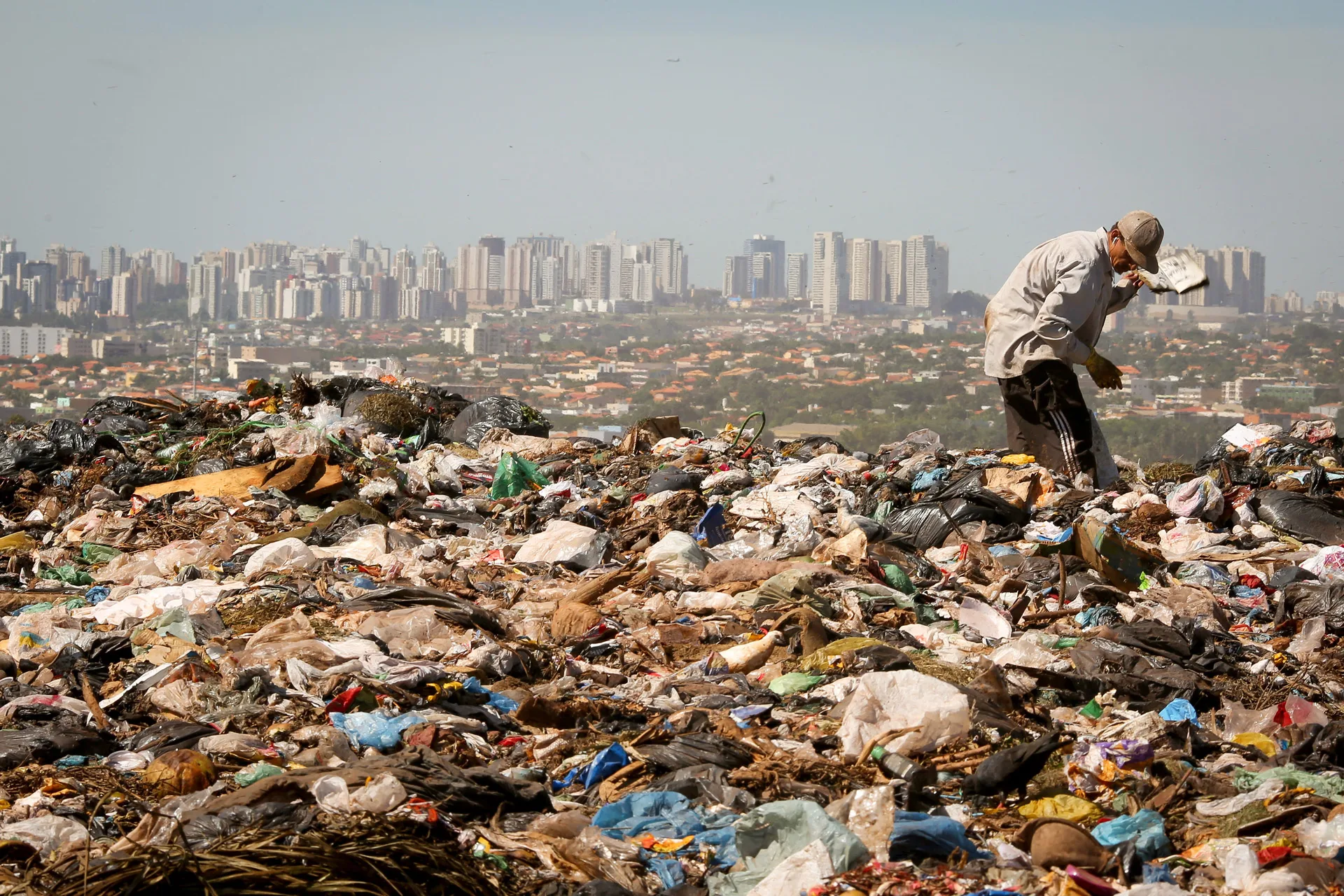Ian Angus is part of a Marxist current of environmentalist thinkers. He argues that the environmental destruction that accompanied the industrialization of the former Soviet Union (1917-1991) and other communist countries did not reflect the sophisticated writings of German revolutionary Karl Marx (1818-1883). According to Angus, in the 19th century Marx raised the possibility that a human-caused “metabolic rift” in Nature could have drastic consequences. “You only have to look at our world now to recognize that we are in a social and economic system where future generations just don’t count,” the Canadian scholar told SUMAÚMA. “You never hear a politician give a speech where he doesn’t talk about economic growth.”
Angus, 79, lives in North Grenville, a small town in rural Ontario, Canada. This is where the activist, who classifies himself as an “ecosocialist,” writes books and articles about the climate emergency and proposes pathways to at least containing the threat to life on planet Earth. Life, the thinker says, has never been possible without taking from Nature, but neither is it nor can it ever be possible without giving back to Nature, something capitalism fails to do, as the latter system focuses on today without thinking about tomorrow.

Angus and the Brazilian edition of his book: not all humans are to blame for the system that has produced ‘gross inequality.’ Photos: Reproduction and personal archives
A responsible thinker, Angus tackles contradictions and doesn’t resort to facile discourse. “There’s a tendency in some of the degrowth movement (which advocates economic contraction for environmental reasons) to think the real problem is that everyday consumers are all greedy. But telling ordinary workers that they should have less probably isn’t a good start,” he warns. “We have to look at the degrowth issue as a social issue and at things in our societies like advertising and military spending, which produce profit but actually have negative effects on ordinary people’s lives, whether they realize it or not.”
Angus also has insightful things to say about the role of soy, a topic of special interest to those who follow the destruction of Brazilian biomes such as the Amazon, Cerrado, and Pantanal. “There’s a lot of talk about feeding the world, except the money isn’t being invested in food for people. Huge expanses of the natural world are being used mainly to feed chickens and pigs. It’s a really destructive way to feed the world,” he says. “In the soy business, you basically cut everything down and create huge plots where you can grow acres of soy and do nothing else. We’re mostly not talking about individual farmers here, but giant agricultural corporations.”
Portuguese speakers now have a chance to read Angus’s book Facing the Anthropocene: Fossil Capitalism and the Crisis of the Earth System (Monthly Review Press, 2016), released in translation in Brazil in 2023 (Boitempo) . The book begins with an explanation of how the Anthropocene differs from the Holocene, the geologic epoch that began some 12,000 years ago and whose name stems from the Greek for “entirely new.” The difference has to do with how carbon dioxide has affected the planet’s equilibrium. Angus argues that the Anthropocene is directly related to the capitalist system, particularly to “fossil capitalism,” which uses Nature for the incessant generation of profits through the exploitation of such fossil fuels as coal, natural gas, and oil. Not all humans are responsible for the system, he points out, since it is characterized by “gross inequality: an unparalleled accumulation of wealth in the hands of a very few.”
In this interview with SUMAÚMA, Ian Angus talks about the ideas set out in Facing the Anthropocene and explains the origin of his thought. The interview took place in late March 2024, shortly after the Sub-commission on Quaternary Stratigraphy, part of the International Union of Geological Sciences, rejected the proposal to formally endorse the idea that we are in a new geological epoch, the Anthropocene. The term, which derives from the Greek word antropos, or human, is already broadly used by scientists and environmentalists to designate an era when human activities interfere directly with earth’s structure and speed up climate change.

New York financial district: degrowth means redirecting resources to social needs, says Angus. Photo: Eduardo Munoz/Reuters
Read the main excerpts from the interview below.
SUMAÚMA – Many people have questioned the decision by the International Union of Geological Sciences’ sub-commission not to endorse the idea that we have entered the Anthropocene. Could this decision lend support to climate change deniers?
IAN ANGUS – You have to understand that this is a formal process that takes place within the geological organization, which has historically been very conservative. And from the beginning of this discussion of the Anthropocene, many in the older generation of geologists have been hostile to the whole process. First of all, this is because the discussion didn’t start with geologists; it started with earth system scientists, so it came from outside. Secondly, what’s very clear is that this is a huge social and economic crisis, in addition to a natural crisis. And you’re dealing here with people, many of whom spent their whole lives working for oil companies or mining companies, since that’s what geologists mostly do. So there’s resistance to the idea in general, and there’s just a lot of resistance to any change. In some sense, it’s not surprising this happened. But in this case, we have the addition of political currents that influenced the process and are strongly opposed to social change. There will be lots of appeals against the decision.
What political effects will that have?
I suspect the people who deny climate change will use this. They’ll say: “See, the geologists don’t agree with you.” But the reality is also that the concept of the Anthropocene, whether or not the geologists formally endorse it, has been widely accepted in the world of the earth sciences. Most other disciplines and very large numbers of geologists have already accepted the concept is here.
Some claim the sticking point was about when the Anthropocene began. Some argue that, more broadly, it can be said that the Earth system began changing with agriculture. Does this argument make sense?
Certainly that’s the main argument behind the decision. But what they’re doing is ignoring the distinction between change and qualitative change to the system. There is no question that human beings have been changing their environments for thousands of years. What we haven’t had before the past 70 years, 50 years, is change that actually alters the way the earth system works, an actual break with the conditions that have been dominant on Earth for some 12,000 years. The people who voted against formally endorsing the new geological epoch say we’ve been changing things all along. I don’t think most of these people are climate change deniers; they would say, yes, the climate is changing, but technology is going to fix it. The basic argument is: we’ve changed the planet before, we’ve invented new ways of doing things, and we’ll continue to do so. In some sense, they’ve taken the word Anthropocene, which comes from human in Greek, and say humans have been doing things forever. They’ve rejected the idea that the new epoch is the result of radical changes in human society that are modifying Earth.
In your book, you offer a clear explanation of the previous role of carbon in the atmosphere, and how this has changed in recent decades as a result of human activities. Could you summarize this explanation a little?
If we go back some two billion years, there have been times when the earth was frozen solid and other times when the whole earth was tropical and even more than tropical. These shifts occurred naturally, as a result of the way the earth’s orbit works and other factors. But we know that for the past two to three million years at least, the level of carbon dioxide in the atmosphere has varied within very small limits. Somebody has described carbon dioxide as our thermostat: Turn it up a little bit, it gets hotter; turn it down a little bit, it gets colder. We can look at the record of carbon dioxide, which is preserved mainly in the ice in Antarctica and in Greenland, and we can show how the earth’s climate has changed closely in line with the variation in the amount of carbon dioxide. And the range of changes was very small. During the last Ice Age, which ended 12,000 years ago—a very short time in Earth history—the amount of carbon dioxide in the atmosphere was not much less than it has been until recently. It only took a small shift [for the transition to the Holocene to occur]. To be precise, in the last 11,700 years, the Earth’s climate has been stable enough that it has been a good place for human civilizations. All the great human civilizations developed during this period, when you had a climate warm enough for agriculture, when ice was restricted to certain limited parts of Earth, and so on. We’ve had variations, but small ones. And then in the past century, and really in the past 40 or 50 years, the amount of carbon dioxide in the atmosphere has started to soar. It’s getting close to double what it was for that long period. And we can already see the consequences of this. The climate is shifting. We see this happening in real time and much, much faster than it has ever happened by natural processes. When you go back into some of the big extinctions that were caused by periods of shifting climate, if you look at the geological record, you’ll see that the amount of carbon dioxide rose or fell, and then a million years later, the consequences were felt in the climate. Whereas we’re seeing the consequences in a matter of years or decades.
You mentioned that some people believe humans will invent technology to deal with this. But even the International Energy Agency, formed of 31 member countries and 13 association countries, doesn’t think so. According to the agency, carbon capture technologies fall far short of what is needed to control global heating and extreme weather events.
Exactly. It’s really a part of capitalist ideology that no matter what the problem, there’s a technical fix. Because if there’s no technical fix, then there’s something wrong with the society, and the defenders of the society don’t want to believe this. But for any serious science on the topic, even if tomorrow we invented a carbon capture technology that would remove CO2 from the atmosphere effectively and quickly, it would still probably be centuries before it had any significant effect. Today, a very small number of carbon capture projects are removing carbon dioxide from the atmosphere, and the amount collected is the equivalent of taking a few hundred automobiles off the roads. It just is nothing compared with the size of the problem.
I’d like to situate the ideas about ecosocialism that you set out in your book, including your emphasis on the concept of metabolic rift in the history of anti-capitalist thought. What kind of current of thought do you represent and who are your predecessors? Who has inspired your thinking?
I’ve been involved in socialist movements here in Canada my whole life, since I was a teenager. In the 1960s and 1970s, we tended to say socialism would solve everything—sort of the socialist equivalent of the capitalist idea that technology would solve it all. The environmental issue wasn’t considered a big deal. Now that’s not fair to the whole of the left. [U.S. sociologist] John Bellamy Foster has written a book called The Return of Nature: Socialism and Ecology, which shows how there were radical scientists from the time of Marx into the late 20th century who were seriously looking at these questions and showing how economic and ecological change are related and need to be addressed together. But it was really from the 1980s onwards that a layer of socialists started to call attention to environmental destruction. Initially, they didn’t talk so much about global warming but about pollution, loss of biodiversity, the over-exploitation of Nature.

Karl Marx: socialists have rediscovered his writings on the depletion of nature. Photo: John Jabez Edwin Mayal/Wikimedia Commons
But did Marx talk about this in his works?
There has been a tendency to think Marxism had nothing to say about this. Sometimes I think it’s because people have read only three or four books by Marx. But Marx wrote an enormous amount, as did [Friedrich] Engels [Marx’s intellectual partner, who lived from 1820 to 1895]. In this debate, the people who influenced me the most were two American scholars. One is John Bellamy Foster, who I’ve just mentioned, a professor at the University of Oregon and the editor of the [U.S. socialist journal] Monthly Review. And the other was Paul Burkett [1956-2024], who was a professor at the University of Indiana. Almost simultaneously but working separately, they published two very powerful books. Foster’s was Marx’s Ecology: Materialism and Nature [Monthly Review Press]. And Burkett’s was Marx and Nature: a Red and Green Perspective [Monthly Review Press]. What they did was go back to Marx’s work to see what Marx actually had to say, not what people thought he had to say. And don’t forget that a lot of what people thought Marx had to say was influenced by the Soviet Union’s intensive production policies. What you saw in the USSR was a tendency to copy what the capitalist countries had done. People who were environmentally conscious looked at that and saw no difference. So they tended to write off Marxism because of the activities of one specific group of Marxists. Well, what both Burkett and Foster did, but from very different angles, was to show that Marx’s work contained a deep ecological analysis. The word “ecology” hadn’t been invented, nor did Marx ever write “I’m an ecologist.” Marx, as we know, was a materialist. His starting point was that people have to eat before they can do anything. We have to eat; we have to meet our physical needs. In order to do that, we have to produce, and it’s the economy at large that actually creates humans. It’s our interaction with Nature that makes all this possible. All of that is there, but people didn’t look for it because they weren’t thinking about the environmental issue. Foster, Burkett, and then other people who followed them did. One of the things that came out of this search, and that Foster particularly emphasized, is how much Marx used the concept of metabolism, which was a brand-new idea then. The word originally appeared in German as Stoffwechsel in 1815. Around the 1840s, it started to become a big thing in science. Scientists discovered the cell, they discovered how soil worked, and they realized all life depended on this constant exchange and interaction of energy and material. Life wasn’t possible without taking materials from Nature, but also returning materials to Nature. And all of these processes were cyclical. If Nature didn’t constantly recycle everything, life wouldn’t have lasted. This led to the emergence of a new category, the “life sciences.”
Did Marx follow this debate?
These sciences developed in the 1840s and 1850s, at the same time that Marx was writing. He probably got the idea from a man named Roland Daniels, a communist who took part in the uprisings of 1848 in Germany. Daniels was a doctor and scientist, and wrote a book called Mikrokosmos, which took the concept of metabolism and applied it to how society worked. Marx had already been using these concepts, but without the words. In the 1850s, however, he began integrating them into his more general analysis of society and the economy. This appears in the texts he wrote in the 1850s, called Grundrisse: Foundations of the Critique of Political Economy [Penguin Classics], and particularly in the 1860s, when he was writing Capital. Marx was especially influenced by a man named Justus von Liebig [1803-1873], a German chemist. England had a problem with declining agricultural productivity, while their population was growing. Liebig was invited by their agricultural associations to examine the problem. He looked at things and said, “You’re taking all of the nutrients out of the soil and you’re not putting any back. You can’t do that forever. There’s a metabolism here that you have to maintain.” That’s the initial point of this concept of a link between how the economy at large works, how we feed people, how Nature works, how we grow our food. Marx read von Liebig and in the 1860s, when he was working on Capital, he wrote to Engels and said he’d learned more from reading von Liebig than all the other German economists put together.
How did he use Von Liebig’s observations in his writings?
He said there’s a universal metabolism; all of Nature works this way, not just agriculture, and what we see in agriculture is a rift, a break between the nutrients we take out and the nutrients we put into Nature, which then recycles them. Plants grow, they die, animals eat the plants, they die, and their bodies go into the land, which then uses them to grow plants again. That’s how Nature normally works. As agriculture became a mass industry, that cycle was broken. You harvest the food, ship it to large cities, and then everybody’s waste is dumped in the river. All of those nutrients, instead of going back to the land, end up in the ocean. The pollution of the Thames was a huge issue at that time. That’s the origin of this idea that Foster went back to; it’s come to be called “metabolic rift theory,” the idea that many, if not all, of our environmental problems result from breaks and disruptions in the normal cycles that make life possible on Earth. And, to go back to what we were talking about earlier, for hundreds of millions of years, we breathed in oxygen, we breathed out carbon dioxide, and plants did the opposite. And there was a fairly stable cycle, but now we’re pumping out far more carbon dioxide than Nature can absorb by its natural processes, and then something else has to change, and what changes is the planet’s temperature.

Soybean plantation in Santarém, Pará: ‘It’s a really destructive way to feed the world, because you cut down all the vegetation,’ says Angus. Photo: Michael Dantas/SUMAÚMA
At the time, Marx was writing in an intellectual environment that was increasingly separating the world of humans from the world of Nature and emphasizing human control over it. In the book Less Is More: How Degrowth Will Save the World (Windmill Books), the anthropologist Jason Hickel calls this “dualism.” Did Marx and other socialists of the time buy into that idea?
The word “dualism” can be a little tricky to use, but Marx wrote in one of his earlier works that to say that man changes Nature is simply to say that man changes himself because we are part of Nature. But he also said that we are something new; prior to our arrival, there was no species that had the ability to change the environment on the scale that we have. So although we are part of Nature, and thus you have a unified view of the world, we are also changing Nature, which is also changing us. From a Marxist point of view, the issue is not “dualism” or “monism” [a concept from Ancient Greece that posits reality can be explained in terms of a single principle or substance], but “dialectics,” that is, the relationship between the part and the whole. So we are part of the whole, but we are also a unique part that is changing the whole environment we’re in.
You’re proposing an “ecological society” or “ecological civilization.” Why do you think an ecological society has to be socialist?
Let’s start off with capitalism. The main driving force of capitalism is to make profit, to increase the wealth of a small layer of people; that’s its whole objective. Many things follow from that. One of them is a society with a short-term view of everything. From the point of view of a capitalist, if I can make money today, it’s better than making money tomorrow, and I’m always competing with other capitalists in order to increase my wealth or income, or even just to stay in business. I must constantly be finding ways to generate more capital, more revenue to make my capital bigger. It’s a whole society that ultimately cannot plan except for short-term gains in wealth. Only by eliminating that as the driver of the economy is it going to be possible to stop large-scale destruction of the environment, because ultimately, the way you get richer is by destroying the environment, taking the natural world and converting it into money. That is what socialism aims to change, eliminating the profit motive as the central driver of the economy. Many other things, obviously, go along with socialism, but that is fundamental: shift the drivers of economic and social decisions to, in Paul Burkett’s terms, “sustainable human development.” Our aim is for a better world for humans to live in that’s sustainable in the long term. In a footnote to Capital, Marx says that we don’t own the earth, we are just its temporary possessors, and we must leave it in good condition for future generations. We only have to look at our world now, to recognize that we are in a social and economic system for whom future generations just don’t count. It’s today that counts. And you never see a politician give a speech where they don’t talk about economic growth. They say we need more, but it’s not more leisure time, or more and better medical care for everybody, it’s not more literature, it’s not a better way of life. It’s more wealth, specifically, more capital.
When you say an ecological society has to be socialist, that we have to remove profit and growth from the equation, do you also identify with the movement calling for “degrowth?”
It’s important to understand that the ecosocialist movement that started in the 1990s developed in parallel to the degrowth movement, which was happening mainly in Europe. A lot of the early work in degrowth sort of assumed that all of this growth was just a problem of bad ideas; all we have to do is tell everybody, “no, do it this way,” and everybody will. They tended not to have a social or economic analysis that said why we were in a society that has this incredible [profit] drive and how to eliminate it. Some of them did very good work describing what the problems were but not explaining them. That has shifted over time. Now there are people like Jason Hickel. I don’t agree with everything in his book, but I think fundamentally, he’s hitting the right points and bringing an ecosocialist analysis. John Bellamy Foster, who was really the originator of a lot of this work on Marxist ecology, wrote a major article about the need to plan for degrowth. He took the idea that we need degrowth but put it in the context of how that would relate to the social and economic changes that are necessary and how to get there. It’s not going to happen because you wish for it. It’s going to happen because we have a society that breaks with the profit motive and moves towards planning for sustainable human development. Another observation is that there is a tendency in some of the degrowth movement to say that the real problem is everyday consumers; they’re all greedy. But to go around telling ordinary workers that they should have less than they have is probably not a good start. We need to look at degrowth as a social issue and think about advertising, military spending, things that produce profit but also produce a negative effect on ordinary people’s lives, whether they realize it or not.

Child wounded in Israeli attack on Gaza: for Angus, cutting military spending would be essential in an ecological society. Photo: Ashraf Amra/Anadolu via APF
You talk about this at length in your book…
Yes, I talk about the things that we could stop doing easily. It wouldn’t cause anyone grief if there were no television commercials. Except, of course, the people who were selling things on television. That part of the economy which is entirely given over to selling things and creating new wants is extraordinarily large. And of course the amount of the economy that is devoted to killing people through military industries is also extraordinarily large. And you could cut it by 50, 90, or 100% and the impact on ordinary people would be very slight.
The linguist and leftist intellectual Noam Chomsky doesn’t like the term “degrowth” because it frightens people, especially in the Global South, where many people have nothing. Isn’t it a way to avoid saying “post-capitalism” directly?
I’m also not a fan of the term, but it’s like “Anthropocene,” it’s the word we’ve got. We’re now seeing a development in the degrowth movement, Jason Hickle being one, where the question is not degrowth as such but rather redirecting [financial] resources to the 90% of the world’s population who do not have enough by any measure. So the idea would be to level out the global use of resources in a planned way to create the least environmental disruption possible.
The historian Adam Tooze, who is not a Marxist, gave a lecture about the Anthropocene at the end of 2023 at Princeton University where he said that despite President Joe Biden’s proposed spending on his “climate package,” economic growth in the United States is still being propelled by military spending. At the same time, the fossil fuel emissions of the US military have yet to be mentioned in global climate agreements. This is an issue you also explore in your book…
John Maynard Keynes [1883-1946], the great British economist, argued that the capitalist economy could be kept going simply by the government spending money whenever there was an economic downturn. In practice, you never get a government willing to do that, but what you do get is what’s been called “military Keynesianism.” Since World War II, the economies of the major capitalist countries have been heavily dependent on tax money for military spending. They spend far more than ever shows up in the budgets, because it’s not just what’s earmarked for the Armed Forces, or weapons, but everything that supports those activities. Military spending has been responsible for a good part of what is called growth in capitalism. And of course it’s deadly growth, because you’re trying to blow up everything you make. Setting aside the benefit of not having wars, redirecting military spending would free up so many resources to solve the issue of inequality in the Global South, to overcome poverty worldwide, to defeat diseases, and so on. And on top of that, it would give us the ability to specifically say, “we’re not taking this out of Nature anymore,” and use the money to reforest, clean the oceans, etc. And it’s only a handful of countries who have such high military budgets, and of course the United States spends more on the military than all of the other countries in the world put together. If you want to define where you would start with degrowth, that’s the place to start.
Many people who promote a post-capitalist economy emphasize something called a “care economy,” where there would be increased investments in people, communities, and services that care for Nature, the elderly, children, and the sick. What do you think?
Without even going into how much that’s a good economic analysis, I think it’s philosophically quite correct. I assume this was true in Brazil, but I know it’s true in Canada, where I live. Here in Ontario, one of the richest provinces in Canada, when COVID-19 became a big thing, there were signs everywhere saying “Thank you” to nurses and doctors. Politicians gave speeches about how the frontline healthcare workers were so essential and important. But at the same time, the government of Ontario passed a law preventing nurses from negotiating higher wages. So, in reality, the politicians didn’t really care. I think a large part of a socialist economy will be ensuring that nobody falls through the cracks. There’s a book called “The Big Fail: What the Pandemic Revealed about Who America Protects and Who It Leaves Behind [by Joe Nocera and Bethany McLean], and in it we see a society where the benefits always go to a tiny minority.
A question of great importance to Brazil is how the current system of food production results in deforestation and soil contamination. There’s now a lot of discussion about the need to change the system we adopted during the so-called Green Revolution. In your work on an ecological society, have you ever explored this term?
I wrote an article in 2023 about soy cultivation and its gigantic impact not just on Brazil but on South America and the world in general. There’s a lot of talk of “feeding the world,” except the money isn’t being invested in food for people. Huge expanses of the natural world are being used mainly to feed chickens and pigs. It’s an incredibly inefficient form of production because you’re using a high-energy product to feed domestic animals, which are only then used to feed people. You lose energy at every level. But, more importantly, it’s a really destructive way to feed the world. In the soy business, you basically cut everything down and create huge plots where you can grow acres of soy and do nothing else. We’re mostly not talking about individual farmers as the problem here, but giant agricultural corporations. With all of this, many people who live off the land are deprived of access to it. You mentioned the Green Revolution, which came originally out of the work the Rockefeller Foundation did in Mexico and then India, which was supposed to solve the so-called problem of overpopulation in the Global South by changing agriculture. It did it by basically three methods. The first was to introduce new strains of vegetables, especially corn or wheat, that presumably had higher yields in small areas. But, to do that required large amounts of water and large amounts of fertilizers, which very few farmers could afford. So you saw this increase in the production of maize, wheat, or several other products, coupled with environmental destruction on a massive scale. Basically, the Green Revolution was the introduction of large-scale chemical farming.
We would need a radical reduction in the use of fossil fuels to limit the rise in the planet’s temperature to 2 degrees Celsius by the end of the century, compared to pre-industrial levels. In this context, how do you evaluate where we are in the global discussion of ecosocialism?
There’s a quote used by the Italian Marxist Antonio Gramsci [1891-1937]: “pessimism of the intellect, optimism of the will.” That was his attitude to life, and it’s the attitude I try to have myself. When I look at the current situation and the apparent complete unwillingness of our rulers to make any substantive changes in the right direction, I feel very unhappy with the world my children and grandchildren will inherit. I don’t see how we could keep global warming under 1.5 degrees Celsius or even 2 degrees. On the other hand, the world can change rapidly. The key question is: are we going to see large numbers of people start moving for change? And I’m not talking about a few thousand at a demonstration. What I, and people like me, work towards is getting enough information out there so that people can start thinking about this and figuring out how to do it, and organizing what we can, where we can. That counts for small towns as well. A few years ago, there were plans to run a pipeline through North Grenville, where I live. It would have carried substantial amounts of tar sands oil, a really dirty oil. Even though this is a very conservative town, where people vote for the Conservative Party, we had meetings and rallies, and we stopped the project. Now that’s a small victory for a small town, but there are victories like that, and we need to build on those. I hope we can before time runs out.

Garbage dump in Brasília: Angus argues that the environmental catastrophe cannot be resolved simply by reducing consumption; the system itself must be changed. Photo: Sergio Lima/AFP
Report and text: Claudia Antunes
Editing: Eliane Brum
Photo Editor: Lela Beltrão
Fact-checker: Douglas Maia and Plínio Lopes
Proofreader (Portuguese): Valquíria Della Pozza
English translation: Diane Whitty
Spanish translation: Meritxell Almarza
Copyediting and finishing: Natália Chagas
Editorial workflow coordination: Viviane Zandonadi
Editor-in-chief: Talita Bedinelli
Editorial director: Eliane Brum





